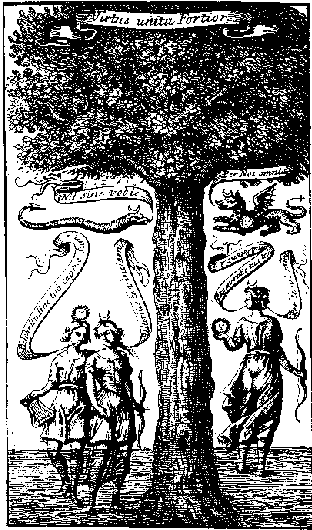Urbigerus - frontispiece engraving
There is an interesting engraved frontispiece to Aphorismi Urbigerani...�London, 1690. At the end of the book is an explanation of the symbolism on this engraving.
A Postscript, containing An Explanation of the Figure, prefixt to the Aphorismi Urbigerani.
The Tree is a Supporter of the Motto, 'Virtus unita fortior': which, being to be read from the side of the Serpent, representing by the Half-Moon on its Head the Planet, under whose Influence it is born, is to be referred to it according to its particular Motto, which signifies, that, if you take it alone, it can do little or Nothing in our Art, as wanting the Assistance of others. By the Green Dragon is to be understood our first undetermined Matter, comprehending all our Principles, (as is demonstrated by the Half-Moon on its Head, the Sun in its Body, and the Cross on its Tail,) and denoting by its Motto, that it can perform the whole work without being joined with any other created or artificially prepared thing: which is our first way. But this our Dragon, when copulating with our Serpent, is forced to comply with her, degrading it self from its undetermined Being for the production of our second way. Apollo with the Sun on his head, and Diana with the Half-Moon, embracing each other, shew our third way, and the Continuation of our first and second. The River, into which they descend, signifies the State, they must be reduced into, before they can be in a Capacity of being born again, and before in any of our three ways they can be brought to a perfect Spiritualization and Union. Apollo and Diana, coming out of the River in one wonderful Body, Diana having obtained all, represent our Herculean works, ready finished and the beginning of their Conjunction, and by their going to set their foot on firm ground, where she is to sow the noble Fruits for the Procreation, is to be understood the Continuation of their Conjunction, till they are fully united and perfected. In this Scheme also, as well as in our Aphorisms, are mystically exhibited all the principal Points of Faith and Religion, comprised in the Volumes of the Old and New Testament: whence it manifestly appears, that the Contemplation of Nature truly leads to the Comprehension of those heavenly Verities, by which alone we can expect to arrive at the Enjoyment of that blessed Immortality, to which, as to the true and ultimate End of our Creation, all our Endeavours are to be directed.
16th Century
Practical alchemy
Philosophical alchemy
17th Century
Practical alchemy
Philosophical alchemy
18th Century
Practical alchemy
Philosophical alchemy
Alchemical poetry
Alchemical allegories
Works of Nicolas Flamel
Works of George Ripley
Works of Sendivogius
Theatrum Chemicum Britannicum
Emerald tablet of Hermes
Rosicrucian texts
Literary works
Texts from Musaeum Hermeticum
Spanish alchemical texts
German alchemical texts
French alchemical texts
Russian alchemical texts

